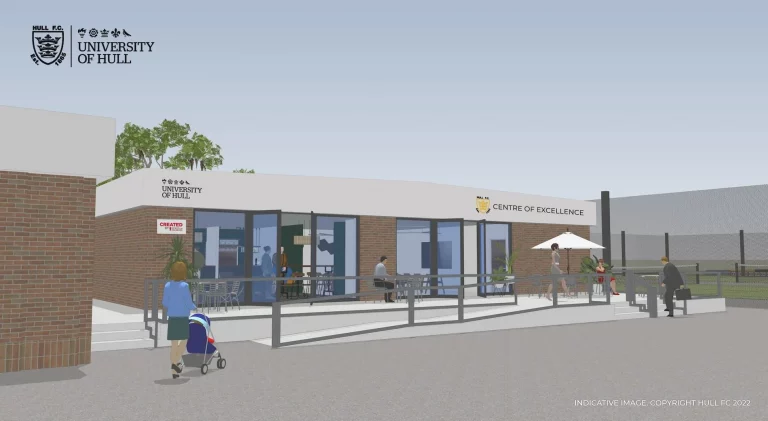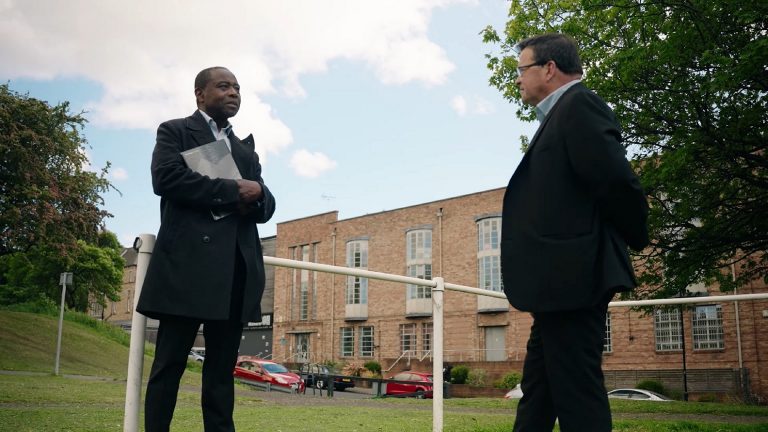Police Commissioner pledges to clean up the city
HULLBID has been handed a major boost to its comprehensive street cleaning programme with significant funding from the Humberside Police and Crime Commissioner.
Commissioner Jonathan Evison, who underlined his support for HullBID soon after he took up his role last year, has provided a grant to cover the cost of a new van and jet-washing equipment.
Jonathan said: “An important part of living and working in any town or city, and for those who visit it, is for people to feel safe and secure. A clean and tidy environment is vital to achieve that.
“I am pleased to have provided funding for this vehicle for the next three years to assist Hull BID in reducing vandalism and anti-social behaviour which will improve the look and feel of the city centre.”
Martin Foster, HullBID’s cleaning and cleaning maintenance operative, takes on around 1,500 tasks every year and is usually hard at work from very early in the morning, long before most businesses have opened their doors for the day.
He does the jobs that are not part of Hull City Council’s remit, from removal of graffiti, which is now rarely seen in the city centre, to the assorted waste hidden in the alleys, alcoves and doorways around the city centre.
Martin also carries out a variety of painting assignments to help businesses keep their fences and frontages looking smart.
Pat Coyle, Client Services Director for Rollits LLP, said: “As more people are returning to their workplaces it’s important that they see the city centre looking clean and welcoming.
“The same goes for the events programme operated by HullBID and various other organisations. If people see a nice, clean environment when they arrived in the city centre for events such as Hull Street Food Nights, the Yum! Festival and Humber Street Sesh they’re much more likely to make a return visit in the future.”
Howard Hewitt, Co-owner of Furley & Co, added: “Martin does a great job and we love him in Princes Dock Street. He gives the area outside the bars a thorough clean twice a year and he responds very quickly to clean up any graffiti and other mess.
“I’m pleased to see HullBID has secured some support for a service which provides a direct benefit for city centre businesses.”
Kathryn Shillito, HullBID Executive Director, said: “Martin was particularly busy when it came to helping city centre businesses prepare to reopen after the series of lockdowns.
“He was jet-washing shop fronts and outdoor seating areas ready for returning shoppers and revellers. His normal working day has a very early start and most of the time he has cleared any mess before the business owners and their staff are aware there was a problem – he leaves a card to tell them he has called!
“The funding from Jonathan will help Martin to deliver an even more efficient service. He’s now equipped with a powerful jet-wash machine and a new van which is also used for transporting materials for our busy events programme.
“We’ve found Jonathan to be a great ally in many ways since he was appointed as PCC, we are extremely grateful for his support and we are already working with him on plans for some new projects.”
Sheffield hosts two-day Active Travel event starting tomorrow
A two-day Cycle City Active City event takes place tomorrow and Wednesday July at City Hall and Barkers Pool in Sheffield, when more than 600 active travel professionals will be welcomed to Sheffield by Cllr Terry Fox, Leader of Sheffield City Council and Oliver Coppard, Mayor, South Yorkshire Mayoral Combined Authority.
They will be joined by leading figures from new Department for Transport executive agency Active Travel England, who will be on hand to introduce themselves and their vision for 50% of trips in our towns and cities being made by walking, wheeling or cycling by 2030.
The event will kick off with a peloton of nurses, doctors, consultants and hospital staff riding from Sheffield’s teaching hospitals – The Royal Hallamshire and the Northern General – to the event venue at City Hall. There will also be cycling and walking tours taking place around the city on both days of the event, including visits to Hillsborough Park and Kelham Island.
Cllr Fox said:”Active travel is a key priority area for Sheffield City Council, from infrastructure to the health and wellbeing benefits for our local residents and those that work here.
“Embracing the great outdoors is an important part of our culture, influencing so much about life in Sheffield. We look forward to sharing best practice, learning from others and welcoming all Cycle City Active City delegates to our Outdoor City.”
Easier and safer active travel options help communities to choose healthy modes of travel for short trips – walking, cycling, scooting and wheeling – which in turn improve air quality and make the region’s streets safer and quieter.
South Yorkshire’s Mayor Olive Coppard said: “Cycling and walking are at the heart of my vision for a cleaner, healthier and better-connected South Yorkshire. Creating safe and convenient routes for active travel, so we don’t have to rely on cars, is vital if we want to improve the health and wellbeing of our communities and meet our ambitious targets for clean growth.
“So I couldn’t be more pleased that that this year’s Cycle City Active City is coming to Sheffield – the Outdoor City is the ideal host for the country’s biggest Active Travel event.”
Innovative private sector companies are also rising to the challenge, with schemes offering shared bikes, e-bikes, e-cargo bikes and e-scooters increasing across the country – and possibly coming to Sheffield soon….
To date, local authorities across the Sheffield region have overseen transformational active travel schemes, from the inspirational Connecting Sheffield programme, the establishment of Active Neighbourhoods across South Yorkshire, and the Active Travel Implementation Plan, which sets out how, by 2040, a fully connected network of walking and cycling routes will link the region for safe and active travel. Sheffield’s physical activity strategy, Move More, is also having great success in boosting inclusive active travel options across the region.
Active travel will also help Sheffield to become a zero-carbon city by the start of the next decade: both Sheffield City Council and South Yorkshire Mayoral Combined Authority have declared Climate Emergencies – in line with more than 525 other local authorities in the UK – affecting more than 61 million residents. In Britain around 93 per cent of the population lives in areas where the local authorities have declared a climate emergency.
South Yorkshire vet practice celebrating a UK first after major acquisition
A South Yorkshire veterinary practice is celebrating a UK first after a major acquisition.
The Pet Vet, which has surgeries in Rotherham, Barnsley, Doncaster and Lincoln has acquired The Vet, registered as Quality Pet Care Ltd.
The purchase of all eight The Vet-branded surgeries makes The Pet Vet not only one of the largest independent family-owned practices by number of sites (12) in the UK, but critically the first to have a national presence.
The newly acquired surgeries are in Warrington, Portsmouth, Southampton, Bristol, Nottingham, Liverpool and Morden and Waltham Forest in London. The Pet Vet already operates three large, purpose-built surgeries in South Yorkshire and in 2021 opened a 5,500 sq ft surgery on a prime retail park in Lincoln.
Founded in Doncaster in 2011, The Pet Vet is under the sole ownership of Dr Rob Jones, who graduated in veterinary science from Bristol University in 1987. He practised in companion animal care in London and Australia before opening the first The Pet Vet surgery.
With almost 100 employees, including 24 full time vets, the practice is known for its investment in all of its people, in technology and in in-house diagnostics. The business has an annual turnover of £6m+.
Earlier this year, The Pet Vet secured £3.1m from alternative lender ThinCats to fund an ambitious growth plan. A rapid extra cash injection then allowed the family-owned independent to snap up The Vet when it came up for sale in April 2022.
The Vet was initially acquired by CVS Group plc, the AIM quoted and third largest veterinary group in the UK, in August 2021.
Dr Mel Fuller, MD, The Pet Vet, said: “The Pet Vet is absolutely delighted to welcome The Vet into our family.
“Our commitment to continual reinvestment of profits in the development of our teams, our services and in new technology, makes our surgeries fulfilling places to work, that offer the highest quality veterinary services to our customers.
“In South Yorkshire and Lincolnshire we have developed centres of excellence for orthopaedic and soft tissue surgery, imaging and dentistry, removing the need for external referral and enabling us to offer our services to other practices within our regions.
“The acquisition of The Vet gives us scope to further expand our expertise and services, offer even greater career progression for our vets, enhance our buying power and increase our influence on the overall quality of first opinion veterinary care in the UK.”
Rob Jones, chairman, The Pet Vet, said: “With nearly 70% of the veterinary practice market by revenue already in the ownership of major corporations, a fact of which most consumers are still completely unaware, this is a real opportunity for us as a South Yorkshire-based family business to make a positive difference for pet owners across the UK.
“Our acquisition of The Vet will allow us to further advance in-house provision, giving our vets more variety and stimulation in their working day and even greater opportunities for professional development.”
Hull FC and the University of Hull unveil plans for unique rugby and education hub
Hull FC and the University of Hull have unveiled plans for a rugby league performance, education and community hub.
Based at the University of Hull, the hub will unite Hull FCs rugby pathways from first team to grassroots for the first time, as well as see University of Hull students offered work placements in key fields such as sports science, coaching, analysis and media.
The £1.5m project, which has also received financial support from Hull City Council and other key stakeholders, will create an unrivalled home for the club’s various teams and community rugby league activity as well as enhance the University’s first-class sports provision further.
Steve Curtis, head of sport at the University of Hull, said: “The University of Hull is excited by this partnership and to play a role in developing rugby league in the region.
“Offering our students the best opportunities and experience whilst at University and beyond is our top priority and this partnership will create some truly exceptional opportunities.
“We’re proud of our history of raising education aspirations through sport and through this partnership, both Hull FC and the University will be able to continue on that path on a greater scale.
“It is a unique partnership in the education sector which reaches far beyond just sport and facilities, we will use rugby league and the partnership to create a clear pathway to higher education for young people across the region.
“The partnership naturally creates some amazing teaching and research opportunities for Sport Health and Exercise Science students, however opportunities and benefits exist across the whole of the University from the Business School, Media Studies, Teaching and our own Rugby League programme to name a few.”
In a unique aspect of the partnership, the club’s blossoming Centre of Excellence will also be based at the new hub, providing an unrivalled playing, training and education experience for young players as well as progression opportunities into higher education at the University.
The Centre of Excellence continues to grow from strength to strength, with over 120 male and female players enrolled in various squads from September 2022, who will now benefit from some of the best facilities in the city as they embark on a career in professional sport.
The project will also see Hull FC providing student placements for Sports Health and Exercise Science undergraduates as well as for other courses including media and marketing.
Students will be able to oversee and attend Hull FC training sessions, complete coaching and match official’s courses through FC and the University’s men and women’s rugby league programmes will be coached by Hull FC which will ensure the facility will not only provide players of the future, but also coaches, staff and officials.
Hull FC have also committed to a studentship, whilst applied research projects will have the dual benefit of ensuring Hull FC is at the forefront of performance science, whilst enhancing the career prospects of students.
The purpose-built hub will mean the Black & Whites will have a long-term base in the city, whilst also benefitting from the University’s world class facilities.
It will offer benefits not only to Hull FC and the University, but also the wider community, by creating an inclusive, high-quality provision to increase engagement and participation in rugby-related team sport coaching, community and education, regardless of background, age, disability or gender.
It is hoped that the new partnership will inspire a legacy for rugby league in the city, with a 110 per cent increase in participation targeted within the first five years.
Hull FC will now benefit from international-standard sports facilities at the University, which is also an official partner of Team GB, as well as a regional base for the Football Association and Super League netball, and recently hosted the final of the Rugby League Wheelchair Challenge Cup.
Boasting a state-of-the-art high-performance gymnasium and indoor sports arena, sports science laboratories, wrestle areas, video analysis suites, four artificial playing surfaces and over 11 grass pitches, it provides Hull FC and the Hull FC Community Foundation with the very best rugby league facilities the region has to offer.
The funding will also enable an extension to the existing University sports Pavilion to provide a home for the club’s first-team squad, development pathways and community activity – set to open in autumn 2023.
The new facility, which will include changing facilities, medical rooms, a video analysis suite and a clubhouse for players and spectators, will also be used for match days outside of the first-team squad, including academy, women’s and University teams, as well as providing a facility for local rugby league teams.
The partnership with Hull FC adds further value to the student sporting experience as they will coach and coordinate the Performance Rugby League Programme at the University.
In addition, a number of Hull FC Community Foundation initiatives will also be based at the University, including the successful wheelchair rugby league team, PDRL squad and women and girls’ rugby league squads, as well as personal training fitness courses and mental health workshops which will be open to students as well as the public.
Hull FC Chief Executive, James Clark, said: “This is a landmark moment for our club that has been years in the planning, as we strive to better ourselves on and off the field.
“We can finally boast international standard facilities and programmes across our entire club, but also create a lasting legacy at the very heart of our local community and grassroots rugby league which epitomises the hallmarks of Hull FC.
“An extended eight-year Centre of Excellence pathway from 14 to 23, including education and work experience, is an unrivalled opportunity for young rugby players in this city, as well as providing our first-team with the highest standard of training facilities.
“We must thank all the key stakeholders involved, including RLWC2021 and Hull City Council for their foresight and dedication in helping us make this ambition a reality, in particular Jeremy Hartley, Steve Curtis and the senior leadership team at the University of Hull.”
Cllr Rob Pritchard, portfolio holder for communities & culture, said: “We congratulate Hull FC and the University of Hull on this landmark and forward-thinking initiative, and we are delighted that the Council can provide match funding to support services at the new centre.
“We are determined to improve the health and wellbeing of people in the city and we look forward to seeing this incredibly ambitious programme come to fruition; it is a fantastic development for sport and our city.”
Peg production shows Unity means business
A Yorkshire creative agency has thanked Unity Enterprise (UE) for helping it continue its fast track to success throughout the pandemic by producing a short film showcasing the not-for-profit organisation’s work to boost entrepreneurial activity in Leeds.
Peg – which launched in early 2020 with a focus on video storytelling, brand development, PR and content strategy – is based at Leeds Media Centre, one of three business hubs in the city run by UE.
The film features interviews with UE staff together with contributions from other tenants including craft designer and author Corinne Lapierre, and Christina Cambridge of Cardinal Care Services, together with stunning drone footage of the surrounding area.
From a hi-tech multi-camera television studio and production office with the latest equipment for premium video and audio recording, Peg films live broadcasts, webcasts, online content, training videos and other media content.
Its onsite facilities also include an executive green room and extensive storage space.
Dave McCormack, Peg managing director, said he was keen to give something back after the “selfless” efforts by the UE team to support Peg, particularly during periods of lockdown.
He said: “Covid presented huge logistical challenges for everyone, but it was especially difficult for start-ups seeking to establish themselves in a desperately uncertain business climate. However, Adrian and Pauline at UE could not have done more to support us and enable Peg to flourish.”
UK manufacturing slowdown continues as business optimism dips to lowest level in over two years
The slowdown in the UK manufacturing sector continued at the end of the second quarter, as June saw output growth grind to a near-standstill pace and new orders contract for the first time in 17 months. Business optimism dipped to its lowest since May 2020, as the number of firms expecting production to rise over the coming year fell to 47% (from 55%
in May).
The seasonally adjusted S&P Global / CIPS UK Manufacturing Purchasing Managers’ Index® (PMI®) fell to a two-year low of 52.8 in June, down from 54.6 in May. The PMI has remained above the 50.0 mark since June 2020.
Manufacturing production rose for the twenty-fifth consecutive month in June. However, the rate of expansion was the weakest during the current upturn. Performances differed widely across the sector. Consumer goods producers saw a marked downturn in output, while robust expansion was again registered in the investment goods industry.
June saw intakes of new work decline for the first time since January 2021. Companies indicated that the weaker economic outlook, reduced new export order intakes, slower
growth of domestic demand, the war in Ukraine, raw material shortages and the slowdown in China all contributed to the reduction in new work received.
The consumer goods and intermediate goods sectors were hardest hit by the decline in new order inflows. In contrast, investment goods producers saw new work rise for the fifth month running.
New export orders contracted for the fifth month running in June, mainly reflecting the slowdown in China, rising economic uncertainty, the war in Ukraine and increased
competition. Some firms also noted that ongoing Brexit related difficulties and weaker growth had impacted new order intakes from the EU. New export business declined in
the consumer and intermediate goods industries, and was unchanged in the investment goods category.
The manufacturing slowdown and tougher economic backdrop drained business optimism in June. Firms raised concerns about flat domestic demand, weaker export markets, inflationary pressure, the effect of the increased cost of living on consumer demand and supply chain issues. Positive sentiment fell to its lowest since May 2020, but companies still expect output to be higher (on average) one year from now. Optimism was linked to investment, growth plans and hopes for a return to a more “normal” economic environment.
Jobs growth was registered for the eighteenth successive month in June. Increased employment was linked to higher output, staff shortages and efforts to reduce backlogs of
work (which fell for the second month running). Staffing levels rose across the consumer, intermediate and investment goods sectors and at small, medium and large sized producers.
Price inflationary pressures remained elevated at UK manufacturers during June. Input costs rose on the back of raw material shortages, stretched supply chains, higher prices for commodities, electronics, energy, oil, paper, plastics and timber (among other items). Higher costs were passed on, in part, to clients in the form of increased selling prices. That said, rates of inflation in both price measures continued to ease.
Purchasing activity increased for the seventeenth consecutive month in June. Increased demand for inputs alongside ongoing supply chain constraints led to a further marked lengthening of vendor lead times.
Commenting on the latest survey results, Rob Dobson, director at S&P Global Market Intelligence, said: “UK manufacturing output growth ground to a near standstill in June, as intakes of new work contracted for the first time since January 2021. Domestic market conditions became increasingly difficult and foreign demand fell sharply again, stifled by Brexit, transport disruption, the war in Ukraine and a global economic slowdown. Business
confidence took a hit as a result, dipping to its gloomiest since mid-2020. Jobs growth also slowed sharply amid the increasingly uncertain outlook and recent surge in energy costs.
“The consumer goods sector was especially hard hit, as household demand suffered a steep retrenchment on the back of the cost-of-living crisis.
“There were some welcome signs that supply-chain constraints and cost inflationary pressures may have passed their peaks. However, with these constraints still elevated overall and demand headwinds rising, it is likely that UK manufacturing will see the economic backdrop darken further in the second half of the year.”
Duncan Brock, group director at the Chartered Institute of Procurement & Supply, said: “The manufacturing sector managed to hold steady last month and remained just above the no-change mark whilst delivering some sluggish results at the same time. New order levels fell for the first time since January 2021 and interest particularly from export markets faded away for the fifth month in a row.
“Supply chain managers reported that ports and paperwork were their undoing in June with Brexit a thorn in the side of manufacturers combined with weaker domestic demand,
inefficient performance in supply chains and an overall shaky UK economy. The consumer goods sector took the brunt of the shortfall overall as the mounting cost of living crisis affected spend for manufactured goods. One bright spot remained job creation as businesses played catch-up after lockdowns and disruptions but hires will soon reach
peak levels without a steady pipeline of work to keep the machines turning.
“As the energy in the sector leeched away, so did optimism which fell to its lowest since May 2020 where only 47% of respondents were hopeful about the next 12 months. The
manufacturing sector may not be the biggest in terms of the UK’s GDP contribution, but its importance may become more critical in the coming years and it needs a better trading environment than 2022 has offered so far.”
British Steel to unveil plans for ‘net zero’ production
British Steel’s Chris Vaughan from Scunthorpe will be among the speakers at the launch of UK Steel’s new report ‘Net Zero Steel – A Vision for the Future of UK Steel Production’ into how the industry can build a greener future.
The report, developed in close collaboration with BEIS and the trade unions at the request of the Rt Hon Kwasi Kwarteng, Secretary of State for Business, Energy and Industrial Strategy, will be published on July 12. In it, the steel sector sets out how it could decarbonise by 2035, the technologies that will need to be deployed, and the policy framework that must be developed in order to secure the future of a net-zero steel sector in the UK.
British Steel is working towards a phased reduction of CO2 emissions by 2030, 2035 and 2050, in line with UK commitments to the Paris Agreement. And Chris, British Steel’s Safety, Health, Environment and Quality Director, said: “The steel we make can play a central role in transitioning to a low-carbon, circular economy and we’ve ambitious plans to invest in a range of technologies to reduce the carbon intensity of our operations, with solutions that are globally recognised and accepted.
“We publicly launched these plans in October 2021 under our low-carbon roadmap, and we’re now undertaking a feasibility study into switching from natural gas to green hydrogen as a fuel source for re-heating furnaces. If the study is successful, we will undertake an industrial-scale demonstration which could see the technology developed and rolled out across all our operations including our main manufacturing base in Scunthorpe. It could also be adopted by other UK steelmakers.
“Embracing new technology and ways of working will help our drive to reduce emissions and support clean growth. The ‘Net Zero Steel’ report is a significant step forward for our industry and I look forward to speaking at the launch.”
Chris will be joined at the event by the Rt Hon Kwasi Kwarteng MP, Mike Thompson, Chief Economist at the Climate Change Committee, Gareth Stace, Director General, UK Steel, and the report author, Frank Aaskov, Energy & Climate Change Policy Manager, UK Steel.
West Lindsey acquires Gainsborough town centre site for cinema
West Lindsey District Council had acquired the site of the former Lindsey Centre in Gainsborough’s Market Place for a four-screen cinema, two retail units, a restaurant, and additional parking.
The plans for the town are being realised thanks to the Council’s £18 million Levelling up Programme.
Council leader Owen Bierley, pictured, said work on the project would start very soon. He said: “This is huge step forward for our plans to build a ‘Thriving Gainsborough 2024’ and ensure the town reaches its full potential. In doing so this will have an economic impact on the wider district as we attract more people to the area.
“It has been a long process, but our team has been working very hard behind the scenes to get where we are and now demolition of the site in preparation for the new build can start. I would like to thank everybody for your patience over the last year since the announcement of the project was made but we are now in the position to get the ball rolling and we are feeling very positive about it.”
The Council was awarded £10 million from Central Government towards its plans, as part of the ‘Levelling up’ Programme, announced last year. Planning permission for the development was granted in November 2020. Demolition of the former Lindsey Centre is expected to start later in the year, and take about twelve weeks.
West Lindsey District Council’s Director of Planning and Regeneration, Sally Grindrod Smith said: “Our Invest Gainsborough Initiative has been making huge strides to improve the town over the years and we have had many successes. However, we recognised that we needed to do more to support our town centre and our high streets in order to revitalise the local economy.
“The former Lindsey Centre is an ideal location for the cinema and commercial units as it has great connectivity across the town and will reinvigorate the market place. We want to ensure our Market Place is the centre piece of the town with spaces and activities for people to meet family and friends, shop at our twice weekly markets and dine out in the town centre.”
The Lindsey Centre was previously Oldrids Department Store and was owned by Lincolnshire Co-op.
Taxi operators face £1,000 fine for failure to provide proper help for disabled passengers
Taxi and Private Hire Vehicle drivers could face fines of up to £1,000 if they fail to provide reasonable mobility assistance to disabled passengers taking a pre-booked vehicle, under new laws which have just come into force.
The new legislation is designed to ensure that the 13.7 million disabled people in England, Scotland and Wales receive the assistance they need and will not be charged over the odds when using taxis and private hire vehicles.
The new Taxis and Private Hire Vehicles (Disabled Persons) Act 2022, which came into force on 28 June, is the most significant change to taxi accessibility legislation since the Equality Act was introduced 12 years ago.
The Act amends the Equality Act 2010 to place duties on taxi drivers and PHV drivers and operators, so any disabled person has specific rights and protections to be transported and receive assistance when using a taxi or PHV without being charged extra.
As part of the amendments, taxi and PHV drivers could face fines of up to £1,000 if they fail to provide reasonable mobility assistance to disabled passengers taking a pre-booked vehicle.
This will also ensure that visually impaired passengers will be assisted by drivers to help them identify or find the vehicle. There will also be a duty for local authorities to publicly identify wheelchair-accessible vehicles in their fleets.
The measures will apply to drivers in England, Scotland and Wales and will help to provide consistency of experience for affected passengers.
Wendy Morton, Accessibility Minister, said: “It is fantastic that the updated legislation and guidance will help ensure that all disabled people receive assistance when using taxis and PHVs.Disabled people account for around a fifth of the population and our Inclusive Transport Strategy is making travel more accessible for all.”
The act was a Private Members’ Bill introduced by Jeremy Wright QC MP. Another change will mean that even drivers granted exemption from assistance duties on account of medical needs must still accept the carriage of disabled passengers and will not be able to charge them more than others.
Lincolnshire leads bid for share in £1m to fund to deliver a hundred EV charge points
Lincolnshire County Council has led a bid for almost £1million in funding as part of Government’s Local Electric Vehicle Infrastructure Pilot, which could deliver more than a hundred electric vehicle charging points in the county.
Five Midlands local authorities submitted the bid as part of Government’s Local Electric Vehicle Infrastructure Pilot.
As part of the bid, LCC has drawn up key areas that could benefit from some of the 43% increase in the number of chargers outlined in the bid: Grantham, Boston, Gainsborough, Skegness, Lincoln, Market Rasen, Sleaford, Hemswell Cliff, Spalding and Louth.
If successful, the £935,355 will be distributed between Lincolnshire, Leicestershire, Herefordshire, Rutland and Stoke-on-Trent Councils.
It is expected that this support from Government will attract an additional £2.8million of private sector investment, with the cumulative funds being used to install a total of 322 standard and 27 rapid public EV chargers across the Midlands.
In Lincolnshire, the funding will be used to deliver 101 standard and 8 rapid charging points across the county.
The majority of these will be on-street chargers in residential areas with the remainder being placed in council-owned carparks and other council-owned land. It is hoped that this pilot could pave the way for a larger, region-wide installation scheme.
Last year, analysis by Midlands Connect found that Lincolnshire needs 1,404 new public EV charging points by the end of 2025 to meet the needs of the growing EV market.
Estimates suggest that the installation and maintenance of electric vehicle charging points will also create an influx of jobs in the region with over 3,600 related roles set to be created in Lincolnshire by the end of 2032.
At present, 93% of electric vehicle owners have access to off-road parking.
It’s hoped that increasing the number of public charging stations will make it easier for those without a driveway to make the switch to an electric vehicle, while also increasing the ease of travel and charging for all EV users in the county.
Cllr Martin Hill, leader of Lincolnshire County Council, the authority leading the bid, added: “We know that residents in Lincolnshire are keen to make greener choices and many are planning to make the switch to an electric vehicle well ahead of the ban on new diesel and petrol car sales in 2030.
“Given that we are such a vast county where motorists often have to travel longer distances, it’s essential that we have a comprehensive network of public charging points in place so that motorists can travel without the worry of losing power, and residents without driveways know they can charge their vehicles close to home.
“We’re very hopeful that this bid will be successful, allowing us to move forward and install the charging points we so sorely need.”












